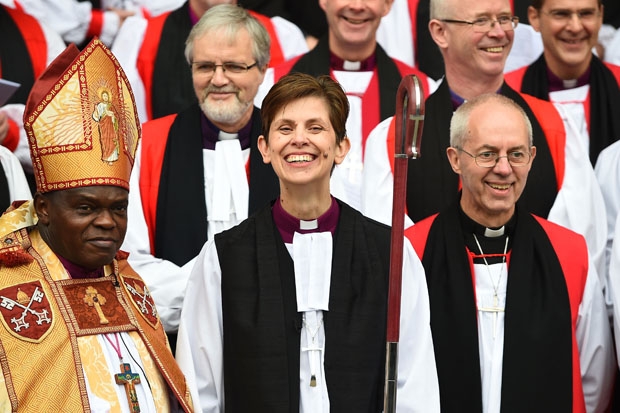There was no shortage of Easter music and talks across the BBC networks with a sunrise service on Radio 4 followed by much fuss and fanfare for the ‘live’ relay of Libby Lane’s first Easter sermon as Bishop. A significant milestone for the C of E as women are at last allowed to don mitres and wield a bishop’s crozier. Three, not to be outdone, invited the Revd Lucy Winkett (who had to outride the brouhaha caused by her appointment as the first woman priest at St Paul’s Cathedral) on to Private Passions, where she proved herself an insightful musician and theologian. Her impassioned explanation of the Easter message, the deep paradox of God’s confinement, nailed to the Cross, even as the Resurrection is about to be revealed, left me wanting more from her and less of the music. Two, meanwhile, gave us the Archbishop of York, John Sentamu, on Good Morning Sunday and in the evening, the Soul Sanctuary Gospel Choir. Even The Archers were on Easter duty with a dawn meeting on Lakey Hill.
It’s surprising now to find so much about the Christian festival on the BBC’s airwaves when such a relatively small percentage of the population actively believe in it. Even more striking, though, was the absence of any other kind of religious observance in this most holy week (it was also Passover). There are mosques, synagogues, temples (Hindu, Sikh, Sufi, Bahai, Mormon) across the UK but very rarely do we hear live broadcasts from these different faiths or programmes that tell us about their rituals and why they believe as they do. And yet, as Sarah Dunant said on The Faith of Children or Kumbayah and All That, ‘It’s very important for us to understand imaginatively what it is like to be consumed by belief.’ This is especially true now when religion has become such a powerful political force.
Dunant was remembering her childhood as a Catholic. She was 13 and some missionaries from Africa were visiting the parish. When she went for weekly confession before Mass, she took it as an opportunity to express her doubts, especially about the Genesis story. She told the priest she didn’t see how it was possible for God to create the world in six days. When he replied, ‘I don’t think you should be watching too much television,’ she was devastated. ‘He can’t answer me,’ she thought, and from that moment lost her faith.
Nija Dalal’s programme for Radio 4 gave us five remarkably honest accounts of being brought up in the faith, from Dunant as a Catholic and also from an Iranian member of the Bahai faith, a female journalist brought up as an Orthodox Jew, a Canadian Muslim and a Mormon. Jenn Ashworth, a novelist, grew up in the Church of Jesus Christ of Latter-day Saints and told us about Pioneer Day, when Mormons dress up as if they were in the Wild West and go on procession, pulling behind them a handcart full of belongings, until a man wearing a false beard declares, ‘This is the place.’ It’s a re-enactment of that original journey when the Salt Lake basin was determined as the home of the first Mormon community. It sounds ridiculous but as Ashworth told it, looking back on her childhood, there was a deeply felt resonance, a purpose.
Abdul-Rehman Malik remembered his first Ramadan at the height of summer in Toronto. Late-night prayers went on at the mosque until 1.30 in the morning, during which he was expected to stand, not having eaten anything through a long, hot day. Afterwards they all decamped to a parking lot where one of his uncles had filled the boot of his Chevy with cans of lemonade packed in ice. It was, he said, the sweetest, most refreshing drink.
These childhood experiences had obviously made a deep impression and moulded adult lives, even for those who have since left the faith. The programme was an illustration of just how impressionable those early years are, and yet the BBC has abandoned all attempts to reach out and make programmes especially for that crucial seven to 13 age group. The last remaining bastion of children’s radio, The 4 O’clock Show, was dropped from Radio 4 Extra last week. It was argued that with only 5,900 listeners it was not viable and that giving the slot back to adult listeners might actually boost Radio 4 Extra’s audience figures.
Out there on the internet it’s possible to find any number of specialist music stations designed for children (tunein.com boasts that it has on site 100,000 radio stations you can visit for free), while Fun Kids, the children’s radio station, broadcasts on DAB in London and has a live schedule. But these stations are all about music and visuals. There’s very little to spark the imagination, provide the kind of mind-opening experience that was once available on the BBC. Why be afraid of pure storytelling? Give them One Direction if you must. But how about giving them also a blast of Chris Watson and his brilliant nature recordings, sounding out bugs, bats, flesh-eating plants? Or David Tennant as Biggles?






Comments